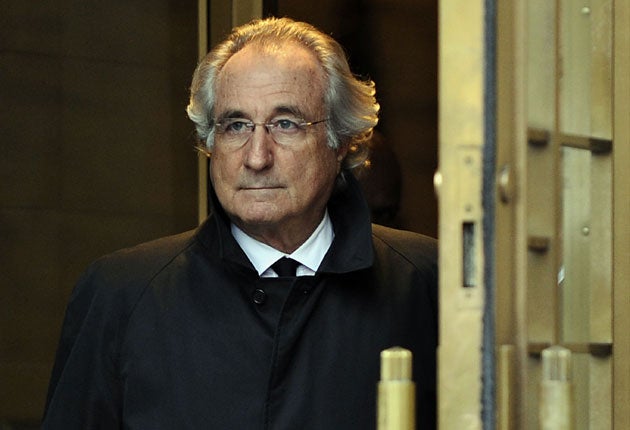Maryrose Fison: A fraudster warning is all very well, but useless if we can't understand it

Another week and yet another Ponzi scheme has come to light.
You'd think the 150-year sentencing of US conman extraordinaire Bernie Madoff would have been a turn-off. Not so.
Last week it was the turn of "Mini-Madoff" Terry Freeman, 62, a rogue trader from Essex who pleaded guilty at Southwark Crown Court in London to defrauding more than 300 people out of £14m.
Like many perpetrators of pyramid frauds – schemes that pay existing investors with cash from new investors – he used the money he raised to fund a lavish lifestyle of holiday homes in France and Cyprus, a top-of-the-range Land Rover, and a £120,000 diamond ring for his new bride.
But while the case in itself is shocking – one couple lost almost all the £1.4m they put into Freeman's scheme – it lifts the lid on a worrying trend.
Swindlers are not a new phenomenon, but what is concerning is that our financial regulators, with all their supposed expertise and technical wizardry, are still allowing some of these disturbed individuals to wreak havoc on innocent people's lives.
Only nine months ago, I sat in a packed courtroom in Chelmsford, Essex, watching an almost parallel case to Freeman's unfold.
Grahame Whitehead, another Ponzi fraudster, younger than Freeman but of strikingly similar appearance, stood ashen-faced in the dock avoiding eye contact with more than a dozen of the people he conned. They looked on as he pleaded guilty to 49 offences affecting more than 40 victims and totalling £12m. He was sentenced to 10 years in prison.
What struck me most on the day was the variety of characters who had congregated in the small, windowless courtroom. There is a prevailing myth that only the clueless will fall for the tricks of a con artist. But this cannot be further from the truth.
What I witnessed in the courtroom that day and gleaned from speaking to half a dozen victims afterwards showed me that we are all susceptible to this kind of lie if we fail to undertake basic checks.
I spoke to a well-respected businessman, successful in his field, whose voice shook as he told me of the humiliation he felt from the betrayal of confidence. A woman in her late 70s said she had travelled more than 60 miles to watch justice done after she lost more than £70,000. Another pensioner, a widow, told how she had lost £190,000 and with it her self confidence. Many others, some with disabilities such as multiple sclerosis, could not be there.
So why is it that our financial regulators and the police aren't stopping all of these individuals before it's too late? I asked the Financial Services Authority what it was doing to prevent Ponzi fraudsters siphoning away consumers' money. A spokesman said the regulator fights financial scams, by "regularly freezing assets, carrying out searches, making individuals bankrupt and prosecuting wrongdoers". He added that one of its most effective tools was education. "By informing people about the dangers of dealing with unauthorised businesses, and the tactics that may be used to con them, we can help them protect themselves."
This raises an important point. In this information age, where we can find out about pretty much anything with a few clicks, we have an arsenal of resources at our fingertips. It could be argued that victims of Freeman and Whitehead might have avoided their fates if they had checked on the regulator's website whether the businessmen promising such attractive returns were authorised and approved.
But hindsight is wonderful, and the reality is that few people are aware of the information that is publicly available, and even fewer can understand the information, as it is couched in such technical jargon. Perhaps this is what our multi-million-pound financial watchdog should pour some of its resources into. Instead of bemoaning the unscrupulous ethics of the individuals after they have been caught, why doesn't the FSA make it easier for individuals to check on financial advisers in advance?
If you want to see whether a financial adviser is legitimate and safe to use you can try the "FSA Register", a database on the City regulator's website. But the terminology this coughs up is ambiguous at best and meaningless at worst for those not inured to the finer workings of the watchdog. "Controlled Functions" and "Appointed rep relationships" might mean something to the people who compile the regulator's databases, but for the person in the street it might as well be gobbledygook.
The coalition has vowed to disband the FSA and split its powers between several new regulators, with supervision to go to the Bank of England and the Consumer Protection Agency.
Perhaps what the new regulatory bodies need to do is to launch a consumer-awareness campaign that makes it crystal clear how consumers can find out, in five minutes, whether the person knocking on their door, or ringing them up, is a bona fide regulated investment adviser or a swindler who wants to buy himself another holiday home.
Subscribe to Independent Premium to bookmark this article
Want to bookmark your favourite articles and stories to read or reference later? Start your Independent Premium subscription today.

Join our commenting forum
Join thought-provoking conversations, follow other Independent readers and see their replies